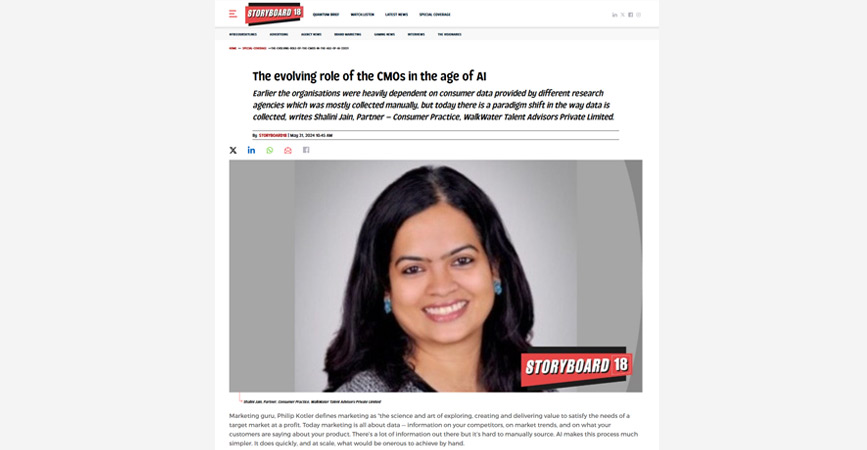
Earlier the organisations were heavily dependent on consumer data provided by different research agencies which was mostly collected manually, but today there is a paradigm shift in the way data is collected, writes Shalini Jain, Partner – Consumer Practice, WalkWater Talent Advisors Private Limited.
Marketing guru, Philip Kotler defines marketing as “the science and art of exploring, creating and delivering value to satisfy the needs of a target market at a profit. Today marketing is all about data — information on your competitors, on market trends, and on what your customers are saying about your product. There’s a lot of information out there but it’s hard to manually source. AI makes this process much simpler. It does quickly, and at scale, what would be onerous to achieve by hand.
With the rapid evolution of AI technologies and AI tools, the CMO’s role has also evolved, and it has enabled a marketer to drive better engagement with consumer through the application of AI tool in core marketing processes. AI has empowered marketers to track key performance indicators (KPIs), measure the effectiveness of their campaigns, and make data-driven decisions to improve future efforts.
Data Driven Decision making:
Earlier the organisations were heavily dependent on consumer data provided by different research agencies which was mostly collected manually, but today there is a paradigm shift in the way data is collected. Today Data analytics and AI tools have become a cornerstone of the marketing function. CMOs rely on data to develop their marketing strategies, there are multiple sophisticated tools available to gather data and drive deeper insights into consumer behaviour, preferences, and trends.
The data driven approach is helping CMOs to make more informed decisions and optimise marketing campaigns and predict future trends. Scaling hyper personalisation, customer engagement and customer experience: With the help of AI tools like Jasper ai, writer.com etc, CMOs are customizing content and offering tailored experience to consumers.
Today AI tools like Custify, HelpScout, Sprout Social etc are analysing customer feedback, social media interactions, and other forms of communication to provide CMOs with a comprehensive understanding of customer sentiment and preferences. This information is crucial for refining marketing strategies and improving customer satisfaction.
Building Equity and Reputation:
An AI driven marketing strategy drives consistent and cohesive marketing messages across all channels which helps in building a strong brand identity and trust amongst consumers, resulting in creating a consistent brand reputation. AI is helping CMOs to develop high touch marketing strategies by analysing customer reviews and feedback resulting in developing emotional connection with customers. This fosters loyalty and advocacy for the Brand, leading to sustained revenue growth.
Automation of Routine Marketing Task:
AI tool like Zapier can automate repetitive marketing tasks such as email marketing, social media posting, customer segmentation etc. This helps the marketing team in spending more time in tasks which are more strategic in nature.
Driving innovation and consumer insight:
AI has helped CMOs to drive innovation around marketing channels, become more experimental, and push the boundaries beyond traditional marketing practices.
Optimising marketing budgets:
AI is helping CMOs to identify the most effective advertising channels and time to reach target audience. Marketers can track key performance indicators (KPIs), measure the effectiveness of their campaigns, and make data-driven decisions to improve future efforts. Continuous tracking and analysis of marketing campaigns help identify what works best, allowing for optimization and better allocation of resources. This leads to precise ad targeting, reduced wastage of ad spends, and higher return on investment (ROI) for marketing campaigns.
Overall impact of AI on a CMO
The AI driven world keeps the marketers on their toes which has resulted in high learning agility, limitless imagination and has enabled them to bring creative ideas to a reality. Given the many benefits that AI algorithms can provide — scalability, reach, efficiency, cost savings, decision making, analytic power, better customer experience, and more — it’s clear that we are still only at the dawn of this AI technology revolution. Marketers have more exciting tools at their fingertips than ever before, allowing the tiniest startup to compete for global success alongside the most established brands.
The author of the article is Shalini Jain, Partner – Consumer Practice, WalkWater Talent Advisors Private Limited. Views expressed are personal.
Source: Story Board 18








